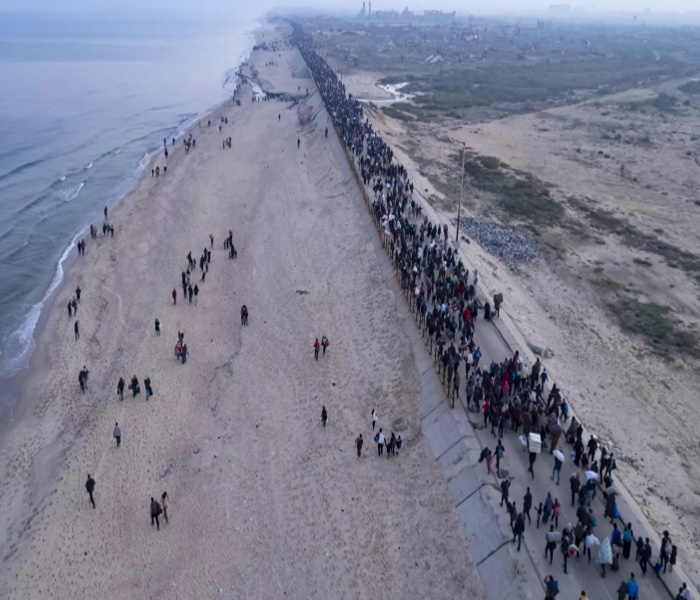Could Gaza Be Forcibly Relocated to the Horn of Africa and Would the World Just Watch?
The world is watching as Gaza is crushed. Children are killed, families starve, and entire cities are reduced to rubble. Israeli Prime Minister Benjamin Netanyahu has repeatedly declared that Gaza should no longer remain Palestinian territory, while Donald Trump has openly floated the idea of “turning Gaza into beaches and hotels” should he return to the White House. No one is stopping them — not with sanctions, not with pressure, only with hollow words.
When power goes unchecked, space opens for ideas that once seemed unthinkable. One of the darkest is now being whispered in diplomatic corridors: forcibly relocating Palestinians from Gaza to the Horn of Africa.
In March 2025, Associated Press and Reuters revealed that the US and Israel had explored the possibility of resettling Palestinians in East Africa, including Somaliland and Somalia. Both rejected the idea outright. Mogadishu has made it clear that Somali territory will not be used to solve someone else’s conflict. Somaliland, which is not internationally recognized, also said no — but its position is far more complicated. Beneath that rejection lies a desperation for recognition that has led it to dangerous choices before.
Somalia says no – Somaliland searches for yes
Since 1991, Somaliland has operated as a self-declared breakaway region, yet no country has formally recognized it as an independent state. In January 2024, Somaliland struck a controversial deal with Ethiopia, granting Addis Ababa access to Red Sea ports and coastal infrastructure. In exchange, Ethiopia reportedly promised to “consider” diplomatic recognition — a pledge it has since publicly downplayed.
The agreement sparked an immediate diplomatic crisis between Somalia and Ethiopia. Somalia accused Addis Ababa of undermining its sovereignty, and several African states as well as the African Union voiced concerns that the deal destabilized the entire region. The episode underscored how Somaliland’s relentless pursuit of international legitimacy — when conducted outside international legal norms and against Somali unity — can act as a catalyst for wider geopolitical tension.
If Somaliland were ever offered recognition in exchange for accepting a forcibly displaced Palestinian population, it’s not inconceivable that some political actors might see opportunity. But such a move would fuse two unresolved statehood struggles into one explosive scenario — with catastrophic consequences both locally and regionally.
For Somalia, the position is unwavering: Somaliland is part of the Somali state, and any plan to “relocate” Palestinians there would be seen as a new form of occupation. Such a step would rip open fragile power balances, pull Ethiopia, Egypt, and Eritrea deeper into confrontation, and turn the Horn of Africa into a blazing arena for great power rivalry.
Arab calculations and a new Gaza without borders
For Israel, forced relocation could be spun as the “final solution” to the Gaza question. For Trump, it would be an easy “win.” For Gulf states, it might mean buying stability without opening their own borders. But the cost would be devastating. Palestine would become a people without a land, and Arab regimes would forever be remembered as those who allowed the dream of Palestine to die.
For Palestinians, relocation would not be a choice — it would be capitulation under duress. Many have said they would rather die than abandon their land. A new “Gaza” in the Horn of Africa would not be a homeland, but a political and legal limbo. And for Somaliland, the price would also be staggering: a demographic and political transformation beyond its control, while the world watched it become an experiment, not a state.
What kind of world do we want?
This is not only about Gaza and Somaliland. It is about the kind of world we want to live in: one where people can be shifted like pieces on a chessboard by the powerful — or one where the right to a homeland and self-determination still holds meaning.
From the Balkans to Myanmar to Western Sahara, history shows that when international law is sidelined, the consequences are always greater and more dangerous than the immediate gains for the strongest.
The solution does not lie in forced relocation but in reinvesting in a genuine two-state solution anchored in international law. Somalia’s sovereignty must be respected, and the region needs a security architecture that addresses water, ports, and migration — without turning people into bargaining chips.
The future of Palestine cannot be drawn in Washington, Riyadh, or Hargeisa. It must be determined in Gaza, Ramallah, and Jerusalem — where it belongs.





